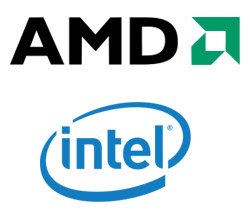Stocks on AMD rose significantly today, up 14% at $3.22, it’s largest increase since July 2011. The cause? Apparently, tech investors on Wall Street caught wind of rumors of a possible AMD buyout from rival Intel.
Over the years, most tech enthusiasts, including myself, usually wouldn’t even give such rumors a second thought. A purchase of AMD by Intel would most likely be blocked by the FTC, due to anti-trust laws; it would leave Intel in control over the entire desktop and server processor market without competition. While I still believe that such a purchase will not happen, several tech investors believe that anti-trust would no longer be an issue, as AMD’s ability to compete head-on with Intel has diminished significantly in the last seven years, as well as the desktop computing market increasingly losing steam to the mobile computing market, where ARM processors currently dominate.
However, if a purchase of AMD by Intel does occur without being blocked by the FTC, there would be several consequences, of which I list below:
1.) Higher processor prices. Without competition from AMD, Intel would be free to set any price on their desktop and server processors.
2.) Innovation slowing down. Without competition from AMD, Intel may decide to slow down processor innovations. A perfect example is the computer audio market, in which computer audio technology stagnated for a significant amount of time, after Creative bought out it’s main and only rival, Aureal.
3.) Delays in the release of new processors. Without competition from AMD, Intel may decide to delay the release of new processors, as it would not be pressured into obsoleting it’s own products too quickly.
4.) Drop in competition in the GPU market. A purchase of AMD would also mean acquiring AMD’s entire graphics division. While it’s possible that Intel could continue AMD’s pursuit of the mid and high-end GPU market, it could put nVIDIA into a difficult situation, depending on how Intel approaches the GPU market. Either way, it would leave the GPU desktop/laptop/server market with two major GPU manufacturers, instead of three.
For these reasons, I would be very much opposed to a AMD buyout by Intel as it would essentially hurt us consumers in the end.
While a purchase by Intel is unlikely, there is still a possibility that AMD may be acquired by someone else, as AMD continues to struggle with cash flow issues. However, any purchase of AMD from another entity would have to be dealt with carefully, as it would mean that AMD would lose it’s x86 license and the license is not transferable (as per Intel-AMD’s x86 cross-licensing agreement).
Sources:
The Wall Street Journal – Chart of the Day: AMD Shares Spike
MarketWatch – AMD surges as Intel, XBox talk surfaces: report
